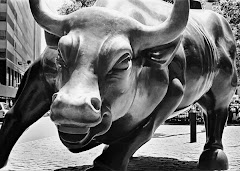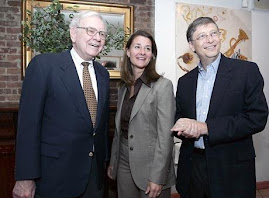Monday, September 28, 2009
Tuesday, September 8, 2009
Potential pennies - the cigarette butt strategy
Posted by
JC
at
1:23 PM
4
comments
![]()
Labels: Investment Strategy
Monday, September 7, 2009
5 Common Warren Buffett Myths Debunked
Somebody posted an interesting article on an investment website about Warren Buffett which I agree in part. Although Warren Buffett has been my role model in investment management, some years ago, I realized that he doesn’t really practise what he preached. For example, he invested in China oil company, junk bonds, currencies etc.
Nonetheless, value investment is still a sound investment approach that works for decades, valid today and for the years to come.
===============================
Berkshire Hathaway (BRKA) recently posted its worst loss ever and the media is buzzing again. This article attempts to clear up some of the most widely portrayed Warren Buffett myths.
Berkshire Hathaway stock, the most expensive stock in the world, peaked at $149.972 in December 2007 and has since fallen at one point over 50% hitting a multi-year low of $70,100 in early March, 2009. BRKA stock today closed at $81,690. Myths below.
1. He buys cheap stocks.
Probably the most common and widespread misconception of Warren Buffett is that he got so wealthy by buying cheap stocks. Though Warren Buffett advocates buying stocks at fair or even firesale prices if possible, it is not the only metric of his decisions. In fact, it may be a relatively minor factor in his considerations.
In his younger years, Buffett bought stocks he called “cigarette butt” stocks. Namely stocks that were selling for attractive prices (i.e. under book value, at a third of working capital etc). He did great but not very great. Buffett later acknowledged that he found out it was much better to buy good businesses instead of just cheap stocks. He later made the bulk of his fortune in American Express, Geico, Coca Cola, Gillette etc.
2. He’s ever wrong.
Yes, even Warren Buffett can be wrong! In the early 1980s, Buffett was worried that hyperinflation would make bonds unattractive investments. But inflation eventually ticked down and hasn’t raised its ugly head yet for nearly 30 years.
Buffett also made mistakes in his stock and bond investments. He bought preferred stocks in an airlines company that almost got wiped out and sold McDonald’s too early. He bought many stocks he later wished he didn’t buy. Most recently, he became the largest institutional shareholder of Conoco Phillips, an oil company, when oil prices were near their highs.
The lesson here is not knocking on Buffett. Instead, realizing that even the Oracle of Omaha can be wrong quite often tells you that losses and being wrong are an inevitable part of investing. The key issue is how we deal with risk and losses, and whether we make a lot more on our winners than we lose on our losers.
3. Buffett doesn’t trade.
Contrary to public opinion, Buffett doesn’t just invest in stocks. Though Buffett frowns on speculation, Buffett does not refrain from making investments in currencies, commodities or even the stock market of a speculative nature. In the early 2000s, Buffett actually shorted the Dollar, tidying up a handsome profit as he covered his positions a few years ago. Buffett has also been involved in silver, copper and oil (as can be seen from his letters to shareholders). Buffett also does arbitrage in the stock market. But he usually controls the sizes of his speculative positions. Perhaps the lesson to be learnt here is only to risk what you can afford to lose if you’re going to speculate.
4. Buffett doesn’t use financial leverage.
This may be one of the most persistent myths about Buffett. Buffett once wrote “Debt is a four letter word.” He strongly preaches against highly leveraged business/financial operations, but in fact, Buffett does use financial leverage. At the start of his investment career, he managed assets for other people. That’s leveraging his knowledge. Later on, Buffett bought insurance companies which generate lots of money from premiums known as “float”. Buffett could invest the float until there were claims from insurees. Though float is low cost compared to the profits Buffett generates from his investments, this is leverage nonetheless.
5. Buffett doesn’t diversify.
This is not true. Berkshire Hathaway owns dozens of companies and has investments in many sectors. True, Buffett says he like concentrating his investments in companies he fully understands. But he also recommends for the investor who doesn’t have much time for investment research that he “believes in extreme diversification”
The Oracle of Omaha is not a god, far from it, but he has many traits and his investment philosophy can be studied and learned from to aid our own personal investment decisions.
Nonetheless, value investment is still a sound investment approach that works for decades, valid today and for the years to come.
===============================
Berkshire Hathaway (BRKA) recently posted its worst loss ever and the media is buzzing again. This article attempts to clear up some of the most widely portrayed Warren Buffett myths.
Berkshire Hathaway stock, the most expensive stock in the world, peaked at $149.972 in December 2007 and has since fallen at one point over 50% hitting a multi-year low of $70,100 in early March, 2009. BRKA stock today closed at $81,690. Myths below.
1. He buys cheap stocks.
Probably the most common and widespread misconception of Warren Buffett is that he got so wealthy by buying cheap stocks. Though Warren Buffett advocates buying stocks at fair or even firesale prices if possible, it is not the only metric of his decisions. In fact, it may be a relatively minor factor in his considerations.
In his younger years, Buffett bought stocks he called “cigarette butt” stocks. Namely stocks that were selling for attractive prices (i.e. under book value, at a third of working capital etc). He did great but not very great. Buffett later acknowledged that he found out it was much better to buy good businesses instead of just cheap stocks. He later made the bulk of his fortune in American Express, Geico, Coca Cola, Gillette etc.
2. He’s ever wrong.
Yes, even Warren Buffett can be wrong! In the early 1980s, Buffett was worried that hyperinflation would make bonds unattractive investments. But inflation eventually ticked down and hasn’t raised its ugly head yet for nearly 30 years.
Buffett also made mistakes in his stock and bond investments. He bought preferred stocks in an airlines company that almost got wiped out and sold McDonald’s too early. He bought many stocks he later wished he didn’t buy. Most recently, he became the largest institutional shareholder of Conoco Phillips, an oil company, when oil prices were near their highs.
The lesson here is not knocking on Buffett. Instead, realizing that even the Oracle of Omaha can be wrong quite often tells you that losses and being wrong are an inevitable part of investing. The key issue is how we deal with risk and losses, and whether we make a lot more on our winners than we lose on our losers.
3. Buffett doesn’t trade.
Contrary to public opinion, Buffett doesn’t just invest in stocks. Though Buffett frowns on speculation, Buffett does not refrain from making investments in currencies, commodities or even the stock market of a speculative nature. In the early 2000s, Buffett actually shorted the Dollar, tidying up a handsome profit as he covered his positions a few years ago. Buffett has also been involved in silver, copper and oil (as can be seen from his letters to shareholders). Buffett also does arbitrage in the stock market. But he usually controls the sizes of his speculative positions. Perhaps the lesson to be learnt here is only to risk what you can afford to lose if you’re going to speculate.
4. Buffett doesn’t use financial leverage.
This may be one of the most persistent myths about Buffett. Buffett once wrote “Debt is a four letter word.” He strongly preaches against highly leveraged business/financial operations, but in fact, Buffett does use financial leverage. At the start of his investment career, he managed assets for other people. That’s leveraging his knowledge. Later on, Buffett bought insurance companies which generate lots of money from premiums known as “float”. Buffett could invest the float until there were claims from insurees. Though float is low cost compared to the profits Buffett generates from his investments, this is leverage nonetheless.
5. Buffett doesn’t diversify.
This is not true. Berkshire Hathaway owns dozens of companies and has investments in many sectors. True, Buffett says he like concentrating his investments in companies he fully understands. But he also recommends for the investor who doesn’t have much time for investment research that he “believes in extreme diversification”
The Oracle of Omaha is not a god, far from it, but he has many traits and his investment philosophy can be studied and learned from to aid our own personal investment decisions.
Posted by
JC
at
11:52 PM
0
comments
![]()
Labels: Investment Strategy
Subscribe to:
Posts (Atom)
2009 F1 Singtel Singapore Grand Prix - 27 Sep
Life at NUS-CMC, and still happening......
Visit www.moblyng.com to make your own!
















